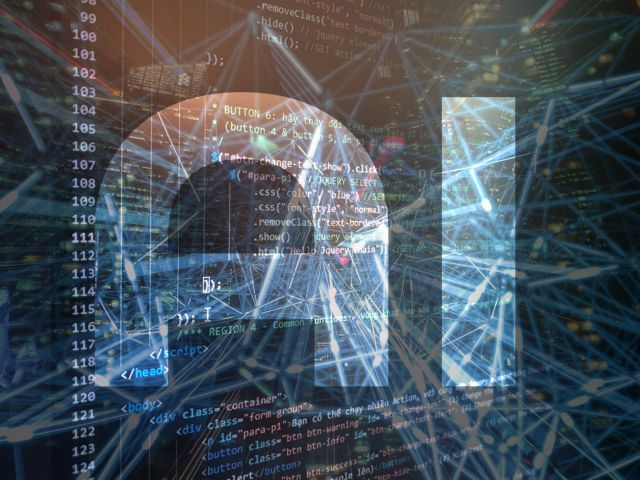 Society
Society

 |
| Illustration of artificial intelligence.— VNS Photo Anh Đức |
By Nguyễn Hằng
HÀ NỘI — Việt Nam is advised to perform data protection well, especially personal data protection, to minimise ethical risks when systems or services using Artificial Intelligence (AI) are rapidly developed in the country.
The reason for this is that all systems or services using AI must depend on data to be operated, Phạm Thanh Long, Senior Research Coordinator of Insight Centre for Data Analytics at University College Cork, Ireland told Việt Nam News on the side-line of a talk show held late last week in Hà Nội by Tia Sáng (A ray of light) magazine.
Việt Nam already issued the Government’s Decree No. 13/2023/NĐ-CP on April 17, 2023, on protecting personal data.
“It’s a good move,” Long said.
The Việt Nam’s Decree No.13 is believed to be similar to a European Union (EU) law on personal data protection, she said.
Effectively implementing the decree is an effective way to minimise ethical risks when systems or services using Artificial Intelligence (AI) are developed, she said.
Mai Tấn Tài, Assistant Professor at the School of Computing in Dublin City University said that there must be a two-way approach, both top-down and bottom-up to limit the ethical risks with AI.
The top-down approach will use government policies and ethical codes for AI scientists, he said.
The bottom-up approach is people's perception of AI. People must always have a sense of protecting their data first, he said.
People should have a common sense to understand how AI operates and how far AI can use people’s data, he said.
AI ethical risks
Analysing ethical risks with AI, Tài said that the first risk is personal security.
In the past, people paid little attention to leaks of personal data because there were not many tools and technologies to exploit that data, he said.
“But now it's different, there are many tools for someone to exploit the exposed data of individuals for shady purposes,” he said.
As a result, people can receive unwanted attention, including daily annoyances such as sales calls and messages, he said.
Tài also said the ethical risks with AI can go even further as more technologies are applied. For example, AI bias.
“You or your children may be excluded from a certain competition, simply because you have some characteristics that make the AI biased against you,” he said.
For example, there may be problems with racism due to the bias of AI. People of colour might be excluded from events, schools or jobs”, he said.
AI is biased because the data is biased. The data is biased because no one can collect it from all parts of the world, he added.
For instance, the data shows that 70 per cent of AI scientists are white. When that data is trained, the AI will understand that the majority of people who study AI are white, he said.
When recruiters ask AI questions like "Please help come up with criteria to find a good AI developer," the system will provide criteria including skin colour, he said.
“In fact, it is not true that white people are better at AI than people of colour, it is just because of the availability of data,” he said.
And AI development companies only have this to go on, they do not get comprehensive data, he said.
Decree No. 13
Decree No. 13/2023/NĐ-CP on personal data protection was issued on April 2023 after four years of compilation, marking the first big step in the efforts to build a legal corridor to effectively protect personal data in Việt Nam.
The decree is expected to minimise the risks and consequences of personal data breaches and join hands with the international community in dealing with threats in cyberspace.
The decree, which has four chapters and 44 articles, came into effect on July 1.
Under the decree, personal data is protected and confidentially stored for an appropriate time for the purposes of data processing. Owners of data must be informed about the processing of data relating to them.
Organisations and individuals that violate regulations on personal data protection will face administrative or criminal penalties.
The Government prohibits the processing of personal data that affects national security, social order, the legitimate rights and interests of organisations and individuals, or taking advantage of the protection of personal data to commit crimes.
The Ministry of Public Security discovered hundreds of individuals and organisations related to trading personal data, Nguyễn Minh Chính, Director General of the ministry's Cyber Security and High-tech Crime Prevention Department said at a conference to direct the implementation of the Decree No. 13 on June 7 in Hà Nội.
A number of large-scale data trading rings were discovered. The largest amount of illegally-collected and traded personal data was nearly 1.3TB of data, including lots of sensitive and internal personal data, he said.
Lê Công Thành, Director of InfoRe Technology, a company specialising in big data processing and artificial intelligence applications, said since the internet boomed in Việt Nam, data protection has not been really considered much.
Việt Nam is among the 15 countries with the highest number of internet users, which means that the number of Việt Nam’s cyber population is very large, he said.
"And I think that the issue of the decree No. 13 is a huge step of Việt Nam, especially for the digital society,” he said
Responsible AI in Europe
 |
| Phạm Thanh Long, Senior Research Coordinator of the Insight Centre for Data Analytics at University College Cork, Ireland. — Photo courtesy of Tia Sáng |
Regarding the responsible use of AI in Europe, Long said the EU AI Act is still a draft law, so large companies are following the law-making process and tracking the change of each word used in the draft law.
“Because the draft law, if approved, will be like the EU’s General Data Protection Regulation GDPR, it will be considered as one of the laws that will have a global impact,” she said.
Smaller companies will be concerned as to whether they can still comply with the law without heavy costs, she said.
"If the control on the development of AI applications is too tight, it will reduce the creativity and innovation of European companies.
“So the EU is also looking to come up with a few models to test to see how the law could impact companies of all sizes and what solutions can be issued.
"The AI Act is hoped to be approved by the end of this year or early next year," she added.
It will have two years to prepare for implementation. Businesses from large to small in the EU are learning to implement it.
EU countries with a better business support platform have been offering solutions to help businesses to comply with the law but still ensure the ability to innovate, she said.
The use of artificial intelligence in the EU will be regulated by the AI Act. In April 2021, the European Commission proposed the first EU regulatory framework for AI. It says that AI systems that can be used in different applications are analysed and classified according to the risk they pose to users. The different risk levels will mean more or less regulation. Once approved, these will be the world’s first rules on AI. — VNS




